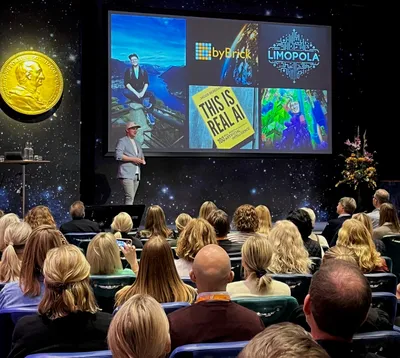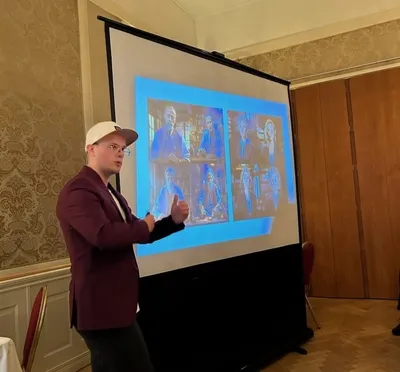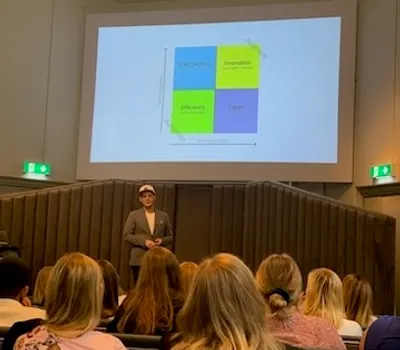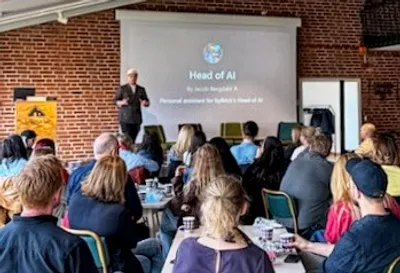Artificial intelligence for everyone
Jacob Bergdahl is one of Sweden's foremost speakers. He performs inspiring and energetic lectures that make AI entertaining and easy to understand. Jacob has been speaking in front of both small and large audiences in both English and Swedish since 2019. He has talked at everything from relaxed after work events and energetic kickoffs to leadership workshops and conferences.
"Jacob makes AI understandable in an entertaining and inspiring way! His presentation contains concrete actions for companies to start with when they begin their AI journey, which was really appreciated! Several participants thought Jacob's lecture was the best AI presentation they've ever heard." - Elin Nordmark, Sveriges Allmännytta (translated from Swedish)
Jacob has spoken at


























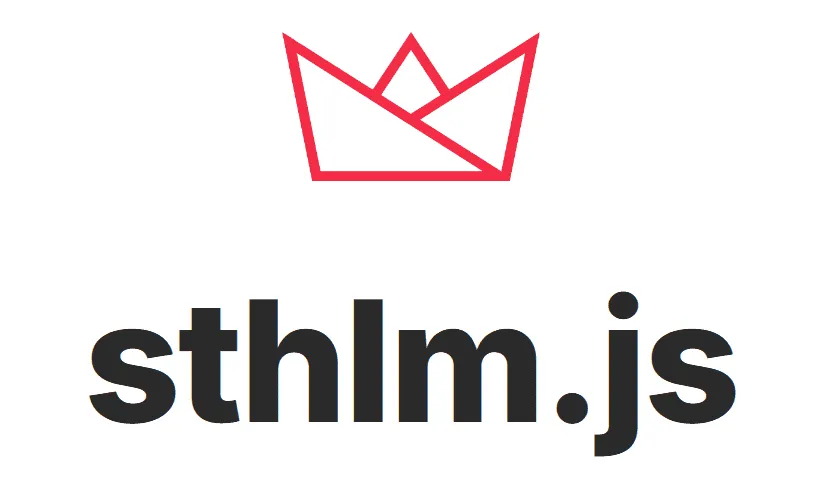





Jacob's lectures
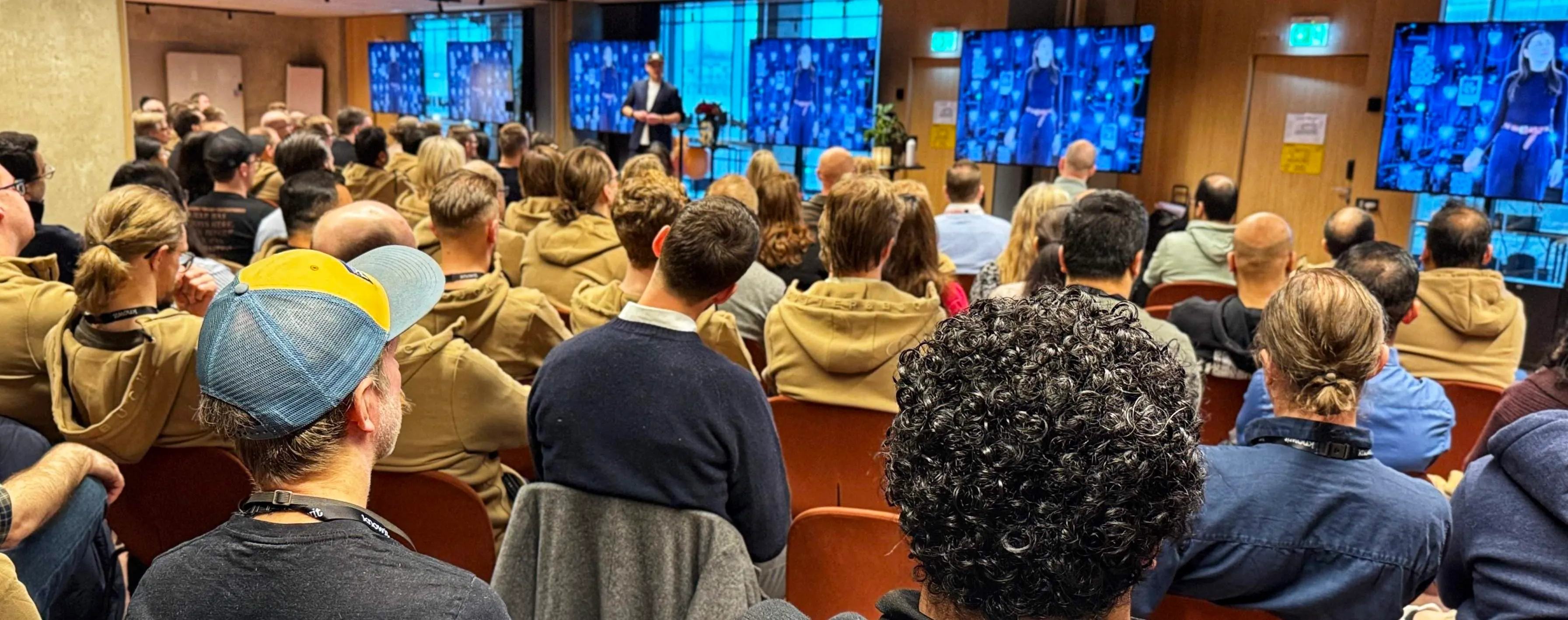
Jacob’s signature lecture: a versatile, fast-paced 45 to 60 minute presentation on AI which suits all contexts and audiences.
The lecture begins with a visually spectacular demonstration of the exponential development of AI through video and music generation. Jacob then showcases how companies across industries are leveraging all forms of AI, followed by a detour into responsible and ethical AI, mixing comedy with serious issues.
Jacob then introduces ChatGPT and the paradigm shift brought about by large language models: the type of AI on which ChatGPT is based. He provides deep insights into large language models and explains the transition into AI agents, a form of technology that Swedish companies are racing to implement in 2025.
Striking a balance between inspiration and concrete insights, the lecture sparks creative thinking and emphasizes the importance of taking action now. The lecture is constantly updated with the latest developments in the field.

On the lookout for something practical? In his popular lecture on ChatGPT, Jacob does a deep dive into its many features, and demonstrates how he uses the platform as a powerful assistant.
ChatGPT has become a mainstream AI platform familiar to many. Yet, many are still unaware of its full potential, using only a fraction of its features and often seeing it as just a search engine or text writer. With its broad capabilities and extensive features, Jacob demonstrates how ChatGPT can be used as an assistant across your workflows.
Jacob shows you how to create a customized GPT (a tailored version of ChatGPT, like his own Head of AI GPT), set up projects, conduct deep research, create images and videos, customize ChatGPT’s behavior, and much more.
Throughout the lecture, Jacob interweaves important AI trends such as agents and reasoning models. He also discusses risks such as data confidentiality concerns and AI hallucinations, as he explains the importance of using enterprise offerings.
If time allows, Jacob concludes the lecture with a comparison to another popular AI platform: Microsoft 365 Copilot.
This is a practical lecture packed with actionable tips for your day-to-day activities.
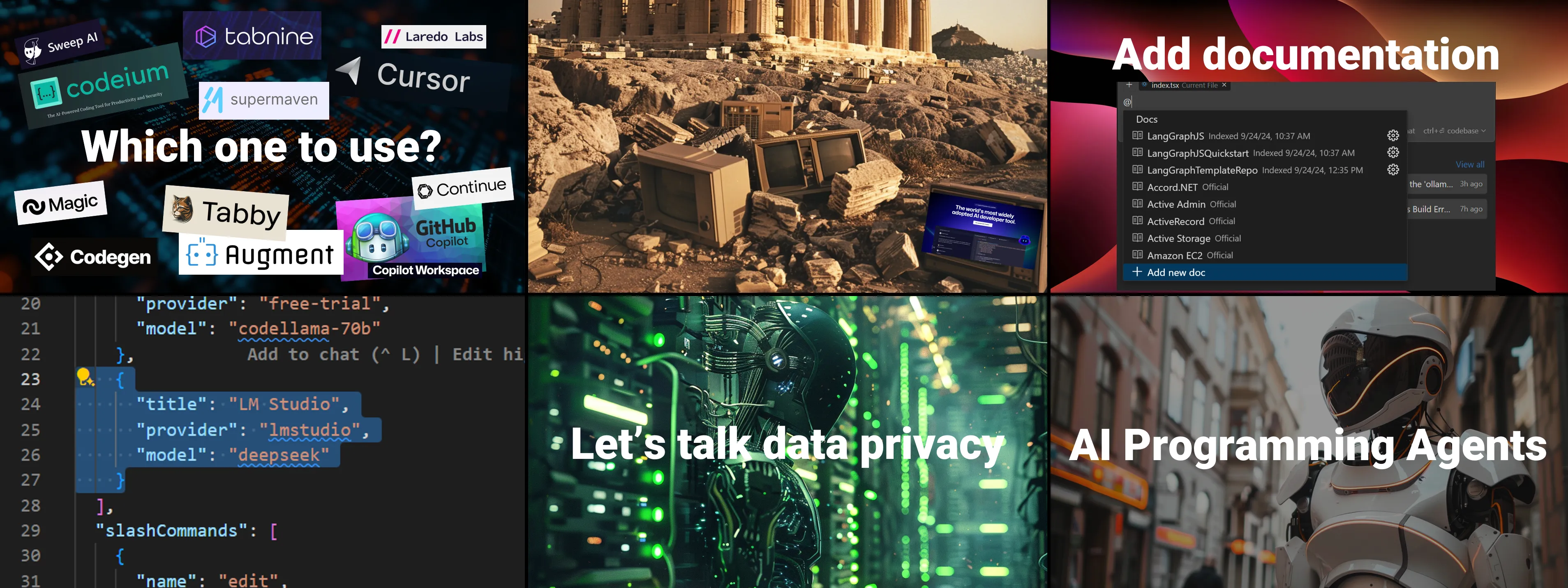
Looking for something for programmers? Jacob has a popular 45 to 60 minute lecture focused entirely on AI for software developers that digs deep into the topic.
Jacob not only explains what programming assistants are, but also how you can get the best possible value out of them, how you should think about security and data privacy, and how to approach processes for responsible AI use.
He walks you through which of all the AI assistants you should use, and also how you can set up local AI assistants that can be integrated into your development environment. Toward the end of the lecture, Jacob discusses AI programming agents and the future of software development in an AI-driven world.
Jacob has been building websites and apps since he was a child. After receiving a master's degree in information systems, he would go on to work as a software developer for some of Sweden's largest companies. By combining his experiences in software development with his sharp pedagogical speaking skills, he has crafted the perfected lecture to elevate programmers to the next level.

Looking for a deep dive into the technology behind the modern era of AI? Large language models, the type of AI used by ChatGPT and Copilot, represented a paradigm shift in AI. Previous AI solutions were built to solve a specific goal. The AI that is best in the world at playing chess cannot drive a car, and vice versa. But large language models have very broad capabilities: they can be used for everything from video analysis to creating Excel files.
Yet we are only at the beginning. When the internet was created, it took us decades before we realized the opportunities that the web entailed. E-commerce, taxi services like Uber, and music services like Spotify took decades before they were invented. Similarly, we have only just begun to realize the potential of large language models.
But how does a large language model actually work? How do we implement them? What do they cost? What is an AI agent? What comes after all the chatbots? And what will our future with large language models look like; are we heading toward a future with 'superapps'? This is a 45 to 60 minute lecture that goes deep into large language models. It does not focus on any particular tool, but instead aims to give participants a deep understanding of the technology and its applications. The lecture is at a level suitable for all participants.

Are you looking for a shorter lecture, perhaps as a unique and exciting inclusion in a larger conference? Or maybe as a treat to spark conversations at an after-work event? The below talks are all exciting gems at just 15 – 25 minutes.
- Stupid, sexist, racist, sycophantic, lying, overconfident AI: a thrilling lecture that blends the hilarious with the frightening as Jacob shows how over reliance in biased AI systems can cause severe issues, as self-fulfilling prophecies become a reality. You will be laughing out loud one second and find yourself frightened the next.
- All about AI agents: a talk that walks the audience through the transition from assistants into agents and details what that means for products and workflows moving forward. Learn how companies like Amazon are building agentic shoppers, how agents are taking over your web browser, and how you can use agents to work faster than ever before.
- Project X: a lecture wherein Jacob walks you through a simple yet very interesting project that he built with LLMs. In this talk, Jacob shows you an AI system that extracts valuable insights from unstructured data autonomously on a schedule, and explains the cost of using AI.
- The exponential development of AI: an exciting talk that shows you just how fast AI has been improving. Through hilarious AI-generated videos and stunning AI test results, Jacob quickly brings a sense of urgency to the audience.
More of Jacob's topics
Jacob's lectures can be combined, adapted, and remixed. Whether you are looking for something shorter or something tailored to you, Jacob can create an agenda that fits perfectly into your event. Below are some additional topics that Jacob speaks on.
- Real-world AI. A trademark topic of Jacob's and the subject of his book. Jacob's approach to AI is to make it concrete, simple, and understandable, ensuring that his lectures are not just inspirational but also informative. With a collection of hundreds of real-world AI use cases, ranging from common recommendation algorithms to AI-powered satellites, Jacob walks you through a number of real implementations of AI. He explains the business and societal impact, the ethical dilemmas, and more, keeping the lectures varied and surprising.
- Generative AI. The most popular form of AI since the launch of ChatGPT, generative AI is a transformative technology that is rapidly evolving. With its ability to perform a wide range of tasks, tools such as ChatGPT mark a new era in AI. Text, image, video, and audio generation are improving at a rapid pace. Jacob explains how these tools work, what alternatives are available, what the latest developments are, what will happen in the coming five years, and practical advice for using generative AI.
- Creating value with AI. For many years, Jacob has been using a powerful and simple framework for creating value with artificial intelligence. He's shared this framework in his book and through viral articles, and even the US Army reached out to Jacob to thank him for sharing, as they used it to explain to their superiors how they use AI within the army. Jacob walks you through this framework to create value with AI and can also host creative workshops where you can apply it to your business.
- Ethical AI. One of the biggest challenges in artificial intelligence is that AI systems have been trained on humankind's long history of discrimination. As a consequence, police and court systems around the world are used to discriminate against minorities. But even everyday tools exhibit biased AI. Ask an image generation AI to produce an image of a lawyer, and it will likely create a picture of a white man. Jacob combines serious conversations with comedic relief to show how biased AI systems create self-fulfilling prophecies – and presents guidelines to prevent it.
- Superintelligence. As we transition from AI assistants to autonomous AI agents, we are inching closer to superintelligent AI, a form of AI that far surpasses human intelligence. Superintelligent AI may allow us to cure all diseases, to make work optional, and to take humanity to the next phase. Yet: it could also spell humanity's doom. This philosophical topic is a great conversation starter and encourages the audience to think about the bigger, long-term picture. Jacob describes the true dangers of AI, and both the utopia and dystopia that superintelligent AI could bring.
- Building Autonomous AI Agents. Jacob built his own architecture for running autonomous AI agents with JavaScript. His agents can be given any mission, such as writing a book, creating a podcast episode, or making a website, and independently figure out and execute the tasks to complete the mission. Jacob explains how he built it, why agents are the natural evolution after assistants, and what technologies one can use to implement AI agents.
- AI for you. Naturally, Jacob tailors AI lectures to your needs, your industry, your topics. Do you seek to AI-enable your organization? Are you looking for guidance on how to start your journey, what AI tooling to use, how to think in regards to AI strategies, or anything else? Please reach out to Jacob with your specific needs, and he will get back to you with a concrete agenda.
Jacob Bergdahl’s lectures are not only adapted to our current times in terms of content but also in how they are delivered. Millennials and Generation Z want information at a fast pace so they don’t lose interest. Jacob delivers insights at a smart, rapid tempo, where new surprises are constantly introduced, while the material remains clear and easy to follow. The audience stays hooked from the first second until the last.
While some speakers tend to always reuse the same content, Jacob’s lectures are continuously updated. As Head of AI, Jacob dedicates the first hour of every day to keeping track of the latest developments and news in AI, and he participates in discussions within AI communities. His lectures are always up to date with the very latest findings, so don’t be surprised if Jacob describes a breakthrough that occurred just two days before your lecture.
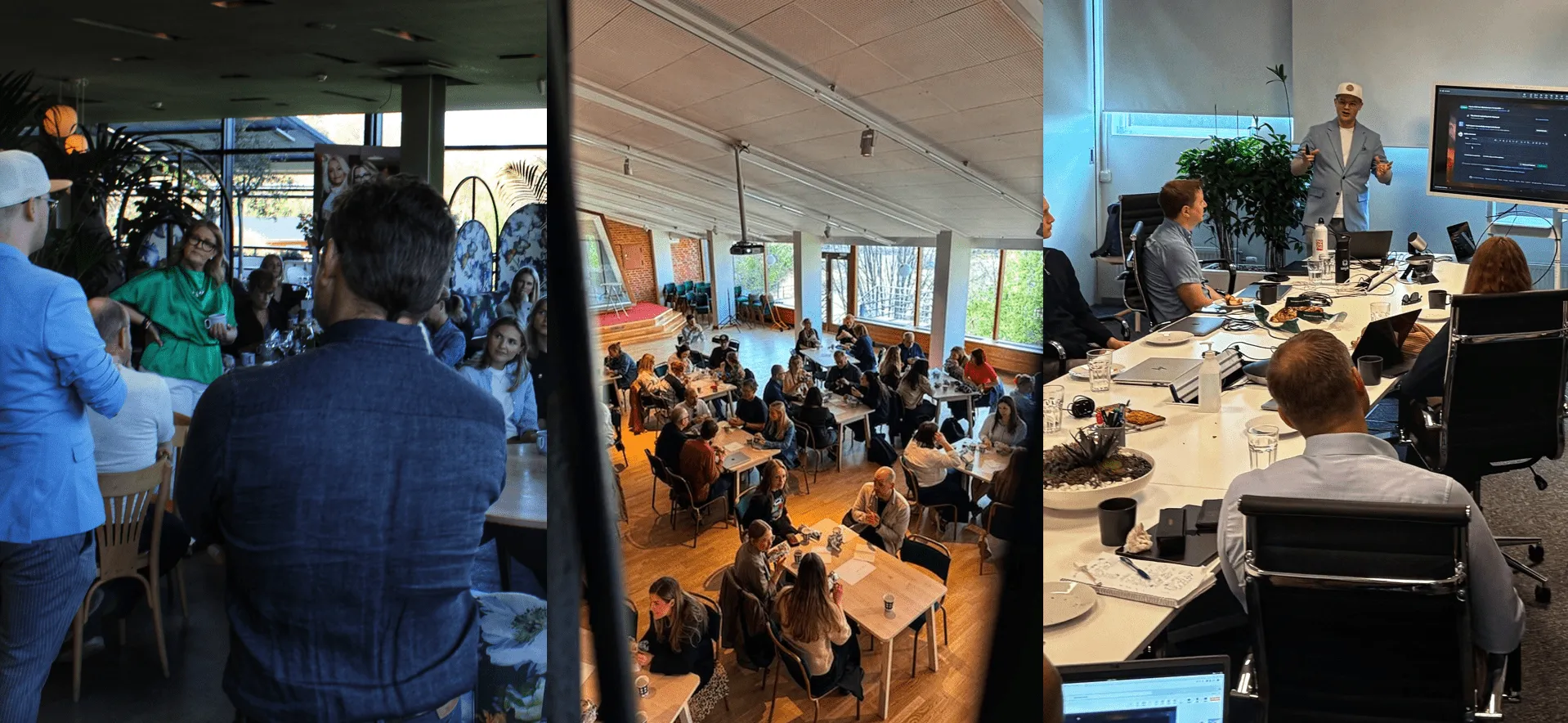
Workshops & trainings
Jacob is experienced in conducting both short workshops and longer training sessions. A workshop with Jacob can range from simply having an open discussion where Jacob provides his expertise to a more structured session where Jacob performs live demonstrations or brings a framework to use as a foundation.
Below are some of Jacob's most popular workshops.
- Become an AI power user: Do you want to get better value out of AI tools such as ChatGPT, Microsoft 365 Copilot, Copilot Studio, Claude, Gemini, Mistral, Github Copilot, Cursor, Lovable, Veo, Midjourney, NotebookLM? Jacob can help turn you into a power user with the AI tool of your choice.
- Harness the value of AI: Jacob can help you identify in which processes AI can create the most value. By looking at the complexities of your business processes, we can determine the impact that applying AI through automation or augmentation would have.
- Build your own AI agents: Jacob teaches you how to use ChatGPT's agent builder to create your own agents.
- Become an AI-driven organization: Every organization should have an AI strategy. Jacob can help you create a strategy for your organization. Learn how to determine whether to steer AI initiatives top-down or bottom-up, how to create an AI vision, how to set up principles of ethical AI use, and how to set goals for the various areas of your business.
A workshop could be done with a small group of people (for example, the leadership team or a specific working group) or with an entire company, and is equally valuable for companies that have not yet started their AI journey or have come a long way.
Jacob conducts both individual workshops as well as longer courses. He continuously educates product managers at one of the world's largest industrial companies in harnessing value with AI.
A workshop can be conducted in combination with a lecture. For example, a lecture on ChatGPT or AI for software developers can be followed by an hour of extended discussion, live demos, or participants on-site getting to test the tools together.

About Jacob Bergdahl
Jacob is the real deal. He doesn’t just talk AI; he lives it. Having written his first AI application in 2013, Jacob would go on to write his master’s thesis on the topic of AI. In 2019, he wrote an Amazon-best selling book on AI. In 2023, he pioneered his own brand-new architecture for running fully autonomous AI agents, and open-sourced everything. Today, Jacob is Head of AI at byBrick.
His background is in software development. Jacob has studied IT at universities in three countries, created solutions for some of the largest organizations in Sweden, written an Amazon best-selling book on AI, worked on Minecraft at Mojang, composed viral articles with 100k+ readers, built JS Is Weird, and created the open-source AI interface Limopola complete with an architecture for running autonomous AI agents.
When he is not lecturing, Jacob works as a consultant who supports or leads companies’ LLM initiatives. LLM stands for large language model and is the kind of AI that powers tools such as ChatGPT and Copilot. LLMs can be used internally, for instance through the aforementioned platforms, but can also be embedded into products. Jacob assists organisations both as a technical LLM developer and as a product owner or project manager. He also provides strategic advice on AI.
Jacob has written software for













AI is everywhere
Artificial intelligence is already everywhere. It’s creating music, videos, perfume recipes, software code, food products, and financial analyses. It’s used to tutor children, match job candidates, scan pizzas, explore Mars, track and identify suspects, and much more.
The technological progress of our times is genuinely astounding. Did you know that if our planet had been created a year ago, humanity would have existed on the planet for ten minutes, and the industrial era would have started only two seconds ago? Technologies that we take for granted today, such as the Internet and social media, barely became mainstream only two decades ago. Meanwhile, the development of machine learning has been exponential, where what was considered science fiction only five years ago is today's reality.
World leaders such as Ulf Kristersson, Donald Trump, Joe Biden, Vladimir Putin, and Xi Jinping have all commented that AI is the most important innovation of our time, noting that the leader in AI will also become the leader of the world.
Just a few years ago, OECD warned its member states that we may be on the brink of a new industrial revolution. Now, that revolution has started.
- OECD notes that 27% of all jobs may be automated by AI. (Source)
- IMF reports that 60% of jobs in advanced economies will be impacted by AI. (Source)
- The United Nations predicts that up to 40% of global jobs will be impacted by AI, as they argue that investments in skills is crucial. (Source)
- Dario Amodei (CEO of Anthropic) believes that AI could wipe out 50% of entry-level white-collar jobs and spike unemployment to 10-20% in the US over the next one to five years. (Source)
- JPMorgan Chase & Co’s CEO argues that AI can augment virtually every job, comparing the technology to the steam engine and noting that their bank found 400 use cases for AI. (Source)
- All US federal agencies must now have a chief AI officer as the United States blazes ahead with plans to embrace AI across the entire economy. (Source)
- A British report shows that 8 million UK jobs may be lost to AI. (Source)
- Klarna’s AI assistant does the work of 700 full-time agents, resolves errands more than five times faster, is 25% more accurate, and is estimated to drive USD 40 million in profits in 2024. (Source)
- 40% of Swedes overall, and 67% of young Swedes, have used an AI tool. One in four people use AI at work. Among white-collar workers, the figure is twice as high, with half using AI. The number increases year over year. (Source)
- AI initiatives already make up 20% of the average company’s IT budget. (Source)
- A Slack study found that 80% of those using AI say that the technology is already improving their productivity. (Source)
- A Pluralsight study found that 75% of organizations already have or formally plan to implement AI solutions. (Source)
- A BCG study found that 89% of executives rank AI as a top tech priority. (Source)
AI is here and now. Industry after industry will be revolutionized with entirely new processes and methods.
A lecture by Jacob makes the topic tangible and inspiring, as he sparks awareness and creativity. Are you ready to take the next step on your AI journey? Reach out to Jacob.
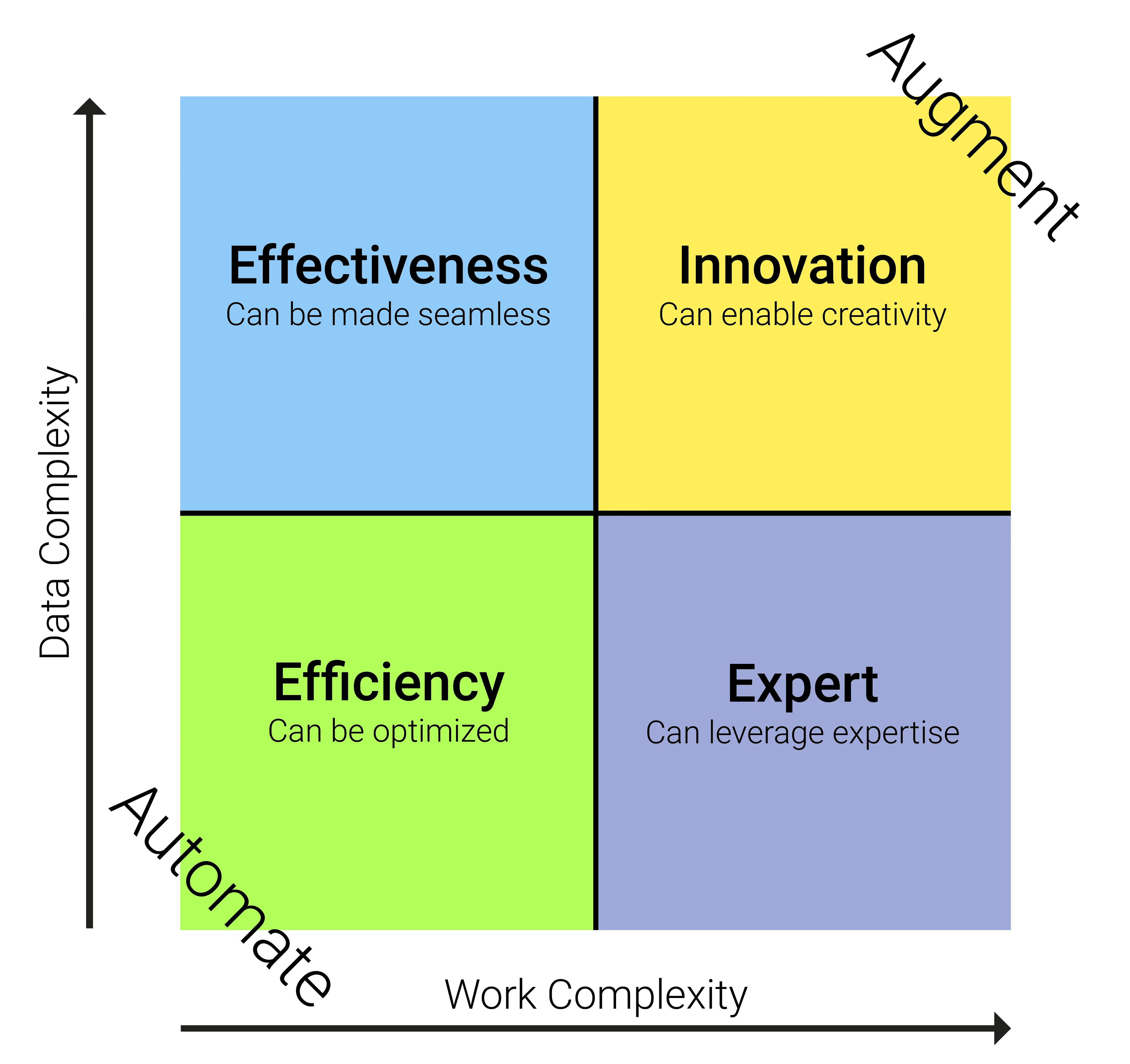
Creating value with AI
There are many tools that help one understand how to apply AI to one's business. From the trusted DVF-framework to simple impact-vs-effort measures, you can apply many different techniques for ideation and implementation depending on where you are in your AI efforts. For companies at the very start of their AI journey, a good idea is to simply experiment and gain familiarity with AI tools.
The framework in the image above is one that Jacob has been using many years. This powerful and simple framework explains the four possible AI strategies which can be applied to business processes. Jacob has shared this framework in his book and through viral articles, and even the US Army reached out to Jacob to thank him for sharing, as they ended up using it to explain to their superiors how they use AI within the army.
Executive summary
It’s important to understand that AI can empower any activity through either automation or augmentation.
- Automation is the removal of humans from an activity.
- Augmentation is the empowering of humans in an activity.
Automation and augmentation are opposite extremes, and few AI solutions are fully automated or fully augmented. Automation and augmentation form a scale that encompasses four strategies.
- The efficiency strategy, in which activities are optimized through automation.
- The effectiveness strategy, in which activities are made seamless, enabling communication.
- The expert strategy, in which AI empowers decision-making.
- The innovation strategy, in which AI enables creativity.
By analyzing the complexity of an activity, we can roughly determine the appropriate AI strategy.
- Low data and work complexity: The efficiency strategy.
- High data but low work complexity: The effectiveness strategy.
- Low data but high work complexity: The expert strategy.
- High data and work complexity: The innovation strategy.

AI software development
Jacob built his first software when he was just ten years old. After getting a master's degree in information systems, Jacob would go on to work for companies such as Microsoft and AddSecure to build advanced systems software.
In 2013, Jacob programmed his first AI application, and in 2023, he became one of the first people in Sweden to create his own architecture for running fully autonomous AI agents, which he made available open-source.
While this website exists to highlight Jacob's services as a speaker, he is also an expert software developer and product owner who can help you build AI features together with his team of senior software engineers.
Have fun with AI
Jacob uses AI to automate and augment his and his clients' work, but he also uses it for fun. In his spare time, Jacob often experiments with the latest AI tools for generating voices, music, video, sound effects, and images. Jacob has even been approached by companies to create AI-generated video advertisements for companies. Have a look at a few videos made by Jacob, and feel free to reach out to learn how they were made. Watch the clips in full screen and with high volume for the best experience. All video, voices, sound effects, and music are AI-generated. They were created in the summer of 2024.
